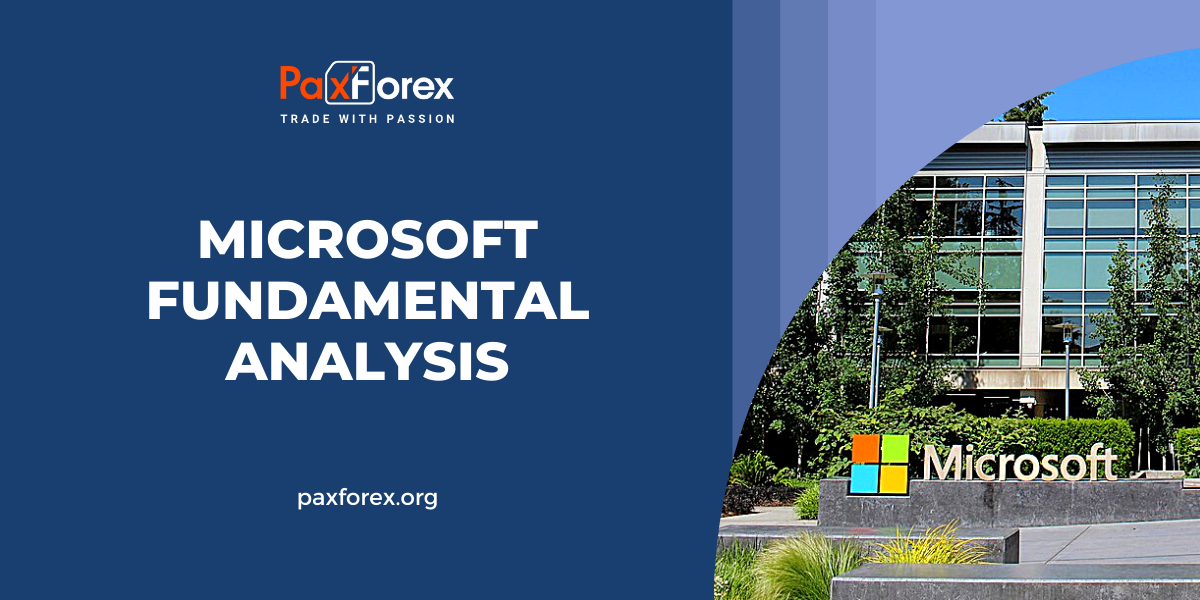
Source: PaxForex Premium Analytics Portal, Fundamental Insight
Microsoft has provided investors with a significant amount of new information about its expansive technology business. In the company's Q3 earnings report, it was revealed that sales growth in its cloud services sector had accelerated, but demand had decreased in its PC business.
Despite the 2023 rally of the stock indicating Wall Street's general optimism about the company, the report had elements that pleased both bullish and bearish investors. Let's delve into the key reasons why an investor might consider buying or avoiding Microsoft's stock.
In Microsoft's Q3 update, which encompassed the selling period through late March, shareholders had plenty of reasons to be satisfied. While executives expressed concerns about gathering demand pressures in areas such as enterprise spending three months prior, their tone has since become significantly more optimistic. During a conference call with investors, CFO Amy Hood stated, "Our results exceeded expectations."
The Q3 earnings report from Microsoft indicated robust sales in the cloud services division and a slight improvement in the PC segment, which had been impacted by the growth slowdown caused by the pandemic. The revenue increased by 10% after factoring in currency fluctuations, which is an improvement over the 7% increase in the previous quarter.
Furthermore, Microsoft is capitalizing on this growth and not experiencing any financial struggles. Net income surged by 14%, while operating income remained high, accounting for more than 40% of sales, which is a leading position in the market.
However, it's important to note that Microsoft's business is not performing well in every area. In the third quarter, the Windows and hardware device niches decreased by 28% and 26%, respectively. Additionally, the company's video game segment was slow as demand continued to decline from pandemic highs. Furthermore, management reported that large corporations are still cautious about spending on the Azure platform due to a slowing economic growth rate. If there is a recession in the tech industry in 2023 or 2024, these pressures could worsen.
Despite Microsoft's growing business, the main risk for investors is paying an excessively high price for it. In contrast to many of its tech peers that have significantly declined since early 2022, Microsoft's shares are not far from their all-time pandemic highs. Currently, Microsoft is trading at over 10 times annual sales, while Apple's price-to-sales (P/S) ratio is 6.8, and Alphabet's ratio is about 5.
Investors who are focused on growth will likely be content with paying a premium for Microsoft's stock. The latest earnings report demonstrates the strength of the company's diverse range of tech products and services. Microsoft continues to expand its market share in highly competitive sectors such as cloud services and cybersecurity while also generating significant profits and cash flow.
According to the new outlook from CEO Satya Nadella and his team, these accomplishments are expected to continue, at least through the next fiscal quarter. This optimistic forecast has caused the stock to rise in response to the earnings update.
Some may criticize Microsoft's premium valuation in an uncertain growth environment. However, the company has demonstrated that it can accelerate both sales and earnings trends, while many of its competitors struggle with weakening results. This ability should lead to exceptional shareholder returns, particularly when the next cyclical upswing hits critical tech areas such as enterprise IT spending.
As long as the price is above 291.00, follow the recommendations below:
- Time frame: D1
- Recommendation: long position
- Entry point: 310.26
- Take Profit 1: 321.00
- Take Profit 2: 331.00
Alternative scenario:
If the level of 291.00 is broken-down, follow the recommendations below:
- Time frame: D1
- Recommendation: short position
- Entry point: 291.00
- Take Profit 1: 281.00
- Take Profit 2: 271.00













